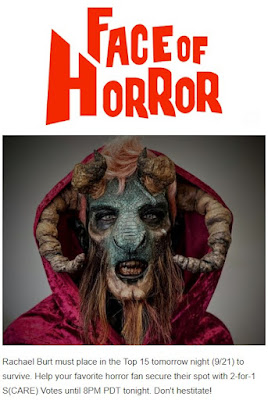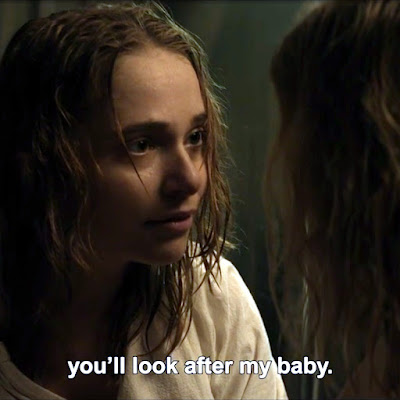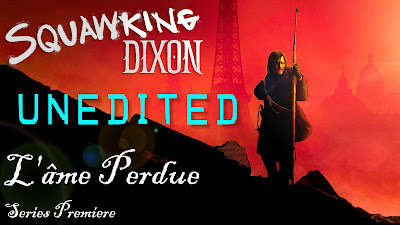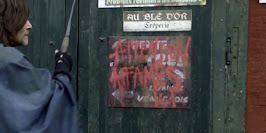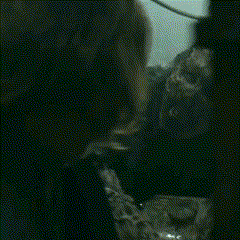|
|
⬇️Listen Now⬇️ |
| ⬆️Tap the above graphic⬆️ to listen to this episode in your favorite Podcasts App |
The second installment of TWD: Daryl Dixon rolls on with some emotional development: assessing the value of "hope", sure, but mostly the weight/cost of promises broken. RJ Gaines from Giddings, Texas the Lonestar State is the MVP of this episode, followed by Mork & Mindy, with all the ways the latter is deeply intertwined with this particular episode.
🛑STOP LISTENING and START STREAMING the unedited version of this podcast! Buying us a ☕coffee on Ko-fi or joining a membership on either Patreon or Ko-fi will grant you immediate access to the uncut version of this podcast, past sessions, and future unedited episode recordings!
| David Cameo: | |
| Rachael Burt: | |
| Sherrandy Swift: | |
| Bridget Mason-Gray: |
| Takeerah: |
- Dave remixed the intro music for the podcast from the following two songs by the Canadian band The Tea Party, off their album Triptych: (mostly) The Messenger and Heaven Coming Down.
- We just released our SQUAWKING Dixon logo design for purchase in our merch store, with (possibly hilarious?) art design to, hopefully, follow soon.
- Bridget shares a drawing her husband, Travis, drew as a child of Jesus being baptized by John the Baptist to illustrate how Laurent could've at least been inspired by all the religious iconography he was surrounded by, daily. It devolves into further mock-bullying of Laurent, or at least the crew responsible for Laurent's supposed depiction of Daryl in the water.
- Takeerah, A walker had a baby! This component is what a significant portion of the audience was referring to, both this week and last, about how this series is compared to The Last of Us (video game/television series). Aside from the obvious comparison to both Laurent and Ellie Williams both being born from a mother who was infected, Sherrandy also compares Daryl Dixon taking-out RJ Gaines to Joel Miller taking out the old man sniper attempting to take of the children in TLoU episode 1x05 Endure and Survive.
- It seems like the majority of hosts really enjoyed seeing the flashback of the fall of France from Isabelle's perspective, but Bridget reminds the audience that it isn't the main reason we enjoy both The Walking Dead Universe and Zombie entertainment that precede it.
- Rachael usually tilts towards favoring momentum in a series and often gives the first few episodes a pass to establish character development. She does appreciate the show taking baby-steps forward while filling in gaps about each character's headspace and motivations.
- It is interesting to see how the apocalypse developed in France, even though the timing of events in France compared to the United States is questioned. It seems as though characters in Zombie horror - not just TWDU - have never heard of zombies or the dead rising, save for Tobias perhaps (from Fear The Walking Dead). Sherrandy appreciated the fear and disorientation we experience through Isabelle's perspective, through both the camera and audio.
@editsaudiosandmore It was such a great episode to see how the virus started in paris #paris #twd #daryldixon #viral #foryou #thewalkinkdead #outbreak ♬ Silence 4 Minutes - Silence for Meditation - Speaking of Isabelle, as she left the club in her flashback, you can not only start hearing people turning inside the club as she exits, but she surveys her haul after having pickpocketed the men she met inside. But you also notice the scars on the inside of her arms, which show the self-harm she inflicted was pre-apocalypse. Compared to the existence she was living, the fall gave her a more righteous purpose.
- Dave theorizes that she may have been taking care of her sister, Lily, after their parents passed away. Her partying was not only a way for her to act out, but a means to support Lily and maintain their standard of living. Usually, the zombie apocalypse frees a character from daily restraints and obligations, but there's an tragic irony of Isabelle having to raise yet another child from birth. And just like her trajectory in life changed, a few times, so too has Daryl's: at the beginning of this episode, he wanted to do anything - even lie to children - to get back home; however, by the end, he fesses up and becomes at least a little more open to listening to the universe.
- But the pre-fall sequence provides actual context to present moments, not for its own sake. As Isabelle, Quinn, and Lily flee Paris, Isabelle comforts her neighbor, a child named Aimée, in the street. It ties to present day as a reflection of the children whose parents never picked their children up from L'École Maternelle Simone Veil (Simone Veil Nursery School). During his first watch, before we get the name of the leader of these children, Dave had a passing notion that maybe she was actually Aimée, but aside from her name being referred to as Lou, there are other factors that make it unlikely. Actually taking notes and discovering the sad stories of children winding up with them, over time, made us particularly emotional. And speaking of emotional, the walker we see in the full-length trailer to the series looks exactly like Aimée...
- The scene where Isabelle is on the subway platform was among everyone's favorite of the episode, mostly because of the way it was shot and how shocking it felt for both the audience and Isabelle. Just as Isabelle exits the subway, she receives an immediate education on the horrors of this world: as her perspective pans across the roundabout, she not only witnesses the newspaper stall owner rise from the dead, but watches a motorcyclist being bitten in the neck by another walker. Lily had been shielded from this experience and never understood the significance of having been bit just after attempting to receive help from the paramedics, while attempting to evacuate the city.
- Turning our attention to Lily's demise during childbirth, it's quite possible that Père Jean kept her as a walker for quite some time in order to alleviate her condition by way of exorcism (until, perhaps, he, too, might've been bit). It's possible that Laurent aided, in some way, with stabilizing both Lily and Père Jean, or at least it seems there was enough evidence to suggest that Laurent was a crucial element in at least suppressing the outbreak. The residents of The Abbey may not have had any experience dealing with the undead yet, too, so they may not have known about the need to kill walkers with a headshot and perhaps treated it as if it was a more spiritual malady.
- Rachael nitpicks on Laurent's fitness as a premature baby, since they usually need a lot of post-natal care. This can be explained by Lily not knowing exactly when she became pregnant, which passes muster with both Takeerah and Rachael who proceed to share their own experiences. But we continue to explore why Lily felt she needed to hide her pregnancy from Isabelle and all signs point to her handler/pimp, Quinn: many theories emerge from that conversation. We bookend this particular conversation by also nitpicking on the miracle that was Isabelle walking from the birthing room into the hall of saints with a completely different, more healthy looking baby.
- Sherrandy muses on the Toulouse-Lautrec poster on the side of a newsstand and its significance. Henri de Toulouse-Lautrec was a famous French painter/illustrator who suffered from a condition that is often named after him. Pycnodysostosis is a condition where the limbs grow at a slower rate than a person's trunk due to a growth hormone deficiency. The relevance: his gait would appear much like a walker's.
- Dave proceeds to tell the tale of St. Laurent/St. Lawrence and its significance to the story at hand. Just as St. Laurent called the cities indigent, crippled, and blind the treasures of the church, so too are these children to both Laurent and Daryl, by the end of this episode. Though it's easy to attribute Daryl's sudden, solemn mood shift - after clearing feeling joy while watching Mork & Mindy with all these children embracing him - to remembering his brother, Merle Dixon, Dave also attributes this to not only dwelling on the past but remembering his own mission: getting to a radio and finding a way home.
- Although we have a chuckle on the fact that Isabelle sounds like an disgruntled girlfriend in the bedroom scene just after this, the point is that she questions Daryl's ambivalence towards these children. It makes sense that she would feel this way if you consider Dave's theory about having to raise Lily is true: The apocalypse was supposed to release Isabelle from these kinds of obligations, yet she was left holding the bag by having to raise Laurent.
- Isabelle questions Daryl's ability to make decisions for a child because he hasn't had any of his own, but we point out that he has been taking care of Rick Grimes' children, Judith Grimes and RJ Grimes, for years. We concede, however, that Daryl's never felt the need to lie to them since they were frequently exposed to dangerous situations from the jump and lying to get them to do what he wanted would probably be more dangerous. A major theme of this episode involves broken promises and whether it's appropriate to lie to get by or rip the band-aid off and be honest, however horrible it might be in the moment. To that end, Dave tells a story from his childhood and how his mother's lie yielded some long-term consequences.
- Sherrandy remarks on the significance of all these children, thus far, allowing themselves to be drawn to a male figure after being predominantly surrounded by women. Daryl being a safe male figure for the children in the show, being a purported spiritual and father figure, is important since most of the dangers in this world come from men.
- According to Bridget, who watched the particular episode these children had, Mork howls in order to wake up Mindy, which might've been the true basis for the children's howling when we first meet them. The series itself is relevant to The Walking Dead: Daryl Dixon because Mork, like Daryl, is a fish-out-of-water character adapting to Earth/American culture. Daryl is also trying to call back to his home (planet), similar to Mork. We go through some of the origins of Mork & Mindy being a spin-off of Happy Days, as well as our own personal relationship to it and other movies and tv shows we used to repeatedly watch, as children. Is it any wonder why these kids are drawn to him? Daryl does things that are super strange to them, just like Mork would.
- Daryl is asked to say grace and delivers a sincere, thoughtful prayer. Bridget discusses the importance of honest conversations with God. Dave brings up the concept of repetition having a higher ascendance in the hierarchy by which Jews observe holidays, not seldomness (which is often seen as special in the secular world), so the children watching the one episode of Mork & Mindy, over and over again, is somewhat holy. Going back to sincere prayer, this was also exhibited by Hannah who was silently praying to God for a child (who ends up bearing the prophet Samuel). This brings us to Lou's prayer to God to heal Madame Dubois: Isaiah's/Yeshayahu's prayer to Hezekiah/Chizkiyahu. Hezekiah falls ill and Isiah tells him to get his house in order because he will die. Isaiah then turns away and beseeches God that Hezekiah may be healed. Despite telling Hezekiah the reality of the situation, Isiah speaking from the heart moved the outcome.
- All of this to really say that Daryl's prayer with the kids sets the stage for relinquishing his immediate desire to go home and be with his family. He, of course, had to act like he needed to do what he had to do to make it home, but prayer has a funny way of changing one's own course. Besides which, (Lou reminds him), family are the people you are with, which Daryl knows since he chose Rick as his brother over Merle.
- We find out that nothing could've saved Madame Dubois suffering, since had long since ran out of her Metformin regimen to treat Type 2 Diabetes. Daryl ends up finding syringes and medications of all kinds in RJ's bunker, but even if they had found Metformin, it was already past the point of no return.
- Takeerah takes a moment to reveal where she believes is the location of L'École Maternelle Simone Veil, as well as the accomplishments of the woman who it was was named after.
- Reciting A Parent's Prayer to St. Joseph is the test Lou administers to nuns Sylvie and Isabelle in order to deem them worthy of their trust. It's poetic, too, since a parents prayer to St. Joseph is a reminder to parents that all children belong to God and the wish that he may foster them, as Joseph did Jesus. Rachael takes a moment to mention that she is named after Joseph's mother, spelling and all.
- Takeerah reminds everyone that this is as much Sylvie's backstory as much as it is Laurent's and Isabelle's. Though they grew up in the same place, Takeerah describes Sylvie as a badass and Laurent as a wuss. Whether you agree or not, Sylvie's origin is a mirror reflection of these children whose parents never returned to pick them up.
- At this point, we deeply discuss Quinn's involvement in Isabelle's - and maybe even Lily's - life. Ritchie, Takeerah's husband, theorized Isabelle might've involved in a ring of females who pickpocketed men. Sherrandy also reminds the audience about a character from Fear TWD who bears the same name (the mirror reflection of June Dorie, from Fear TWD 4x14, MM 54). Many hosts had a darker thought: Quinn was Isabelle's pimp and may have somehow either gotten Lily pregnant or Lily secretly worked for him, as well, which would've been against Isabelle's wishes (hence the reason why Lily thought Isabelle would be angry for keeping it from her). There's a strong belief that Quinn might reappear. Meanwhile, these theories remind Bridget of how the pimp from Idiocracy, like Quinn, had such a strong influence on the film's plot.
- Dave explains that RJ Gaines is a dark-mirror reflection of Daryl: somewhat similar backgrounds, but RJ was willing to do whatever it takes to "get home" (dubious, but crazy is crazy), even if it means pilfering supplies from children, unlike Daryl who can't help himself from saving people in need. What Daryl specifically saw in Gaines was remaining ignorant to the present and lying to children in order to achieve his aims.
Editor's note: we failed to discuss the detail Daryl yells at RJ to prove there's nothing to come back home to, namely that he's been to Texas and it's absolutely devastated due to the nuke that went off, years prior, in Season 6 of Fear The Walking Dead. - Meanwhile, even our hosts try to find some redeeming qualities in RJ: who doesn't admire a hoarder and prepper? Him talking about eating toothpaste on crackers reminds us of episode 6x10 of The Walking Dead, The Next World. As RJ faces his maker (and a teeming horde of moat-walkers), his last yelp, I'm an American! is seen as an amusing but absolutely unrealistic response. As Americans ourselves, we're somewhat glad this series isn't airing in France, at the moment.
- Irish actor, Ned Dennehy, who plays the character RJ Gaines has been in a supporting role in many shows, like Outlander and Peaky Blinders, and a main character in the Australian sci-fi drama, Glitch. Glitch's premise: recent and centuries-long dead individuals from a fictional country town, Yoorana, are mysteriously and suddenly alive again. Later on in the series, there's a more spooky, spiritual explanation for the occurrence, which dovetails neatly with TWD: Daryl Dixon.
- Sherrandy points out that Daryl blowing up the compressed air tanks among the fuel to take out the moat walkers is an homage to the movie Jaws. Finally, one of our TWDU protagonists destroys a place, though the overall structure still holds-up.
- We discuss the two mythical legends that were brought up during the episode: La Bête du Gévaudan and La Tarasque. The presence of The Beast of Gévaudan, which ravaged the rural region in France by hiding patiently and pouncing at it's unwitting prey, is ironic since it's the origin story of the game they were playing: Hide and Seek. What's great about this story is the seek part: the people were desperate to find the beast and slay it to finally lay their fears to rest. Of many heroic accounts, one involved a few of Gévaudan's children.
- La Tarasque was a Sphynx-like beast with the head of a lion, body of a turtle, claws of a bear, serpentine tail, and could blow poison smoke. The latter feature may have been a reason for the children in this episode wearing gas and plague/pandemic masks earlier on in the episode. The monster was slayed by St. Marthe (St. Martha), who doused a cross with holy water, stunning it, then tied her girdle around its neck, lead the beast into town, where the townspeople threw spears and rocks at it until it died.
- The legend of La Tarasque is tied to a fictional story by Alphonse Daudet, Le Tartarin de Tarascon, whose protagonist is a boastful, yet bumbling middle-aged man who is easily deceived (like Daryl has been, thus far) but has a good heart. This allows us to touch on a critique entertainment critics had on this series: Daryl is often the butt of jokes in his own series. We argue that critics don't fundamentally understand or, at least, refuse to embrace the fish-out-of-water trope/cliche, which often pokes fun at the protagonist as they attempt to navigate a world whose customs are, from their perspective, strange. The other baffling critique is that Daryl talks too much, but we argue that the main reason for this is because he was previously among a larger ensemble of characters.
- RJ Gaines is a foil for Daryl: though RJ represents the way in which other countries may view Americans, Daryl serves as an alternative. We discuss how it even came to be that RJ even winds up in France. He may have actually been on vacation with his family and, after losing them all, he suffered a mental break. It could also be that he was somehow involved in France's downfall by either bringing the virus from the states and/or working on the cure while he was here. It may have even been the case that the whole wife-and-kids routine is nothing but a sob story, but maybe there's a kernel of truth in every lie: it could be that he left them several years prior to the outbreak and is using that fact as motivation to return to them decades after abandoning them.
- Takeerah explains that immunity to most diseases works outside of pregnancy, while breastfeeding. Mother's milk contains many antibodies against most diseases. Dave reminds the audience that the placenta can filter out many diseases from the child that afflict the mother, even several forms of radiation exposure. One exception to the latter rule is Ionic Radiation, which had the exact opposite effect and was the source of Athena's demise (Grace Mukherjee's stillborn child: In Dreams, 6x12 of Fear TWD).
- Before Rachael leaves, we mentioned that she's a contestant in the Face of Horror competition! She has the chance at winning $13,000 and a photo shoot with Kane Hodder, who played Jason Voorhees in the Friday the 13th series. She's made it past the first two rounds and could use your support by voting for her every day. The money you spend on Scare Votes for Rachael goes to a fantastic organization called the Be Positive Foundation which, much like St. Jude Children's Research Hospital, funds financial assistance to families of kids with cancer and supports cancer research.
- Out of all the promises that were broken, which we discussed throughout this entire episode, Isabelle's promise to Lily that she would raise Laurent was the only one that was actually kept; however, we were heartened to see Daryl fess-up to Lou about the medicine not having a chance at saving Madame Dubois and apologizing for lying to her in order to get what he wanted.
- Takeerah admits that, though many of us have seen a variation on this theme in zombie horror, seeing a walker have a baby hit her differently. Dave mentions that it's undoubtedly because she is far more emotionally invested in the show (and perhaps the universe built around it), to the point where it's difficult to sometimes comprehend, immediately, that it's fiction. To that end, Dave admits that he became emotional when he realized, on second watch, that Laurent was the one who initiated the Nanu-Nanu during Madame Dubois' funeral.
- Whistling is never a good sign. Dave points out that the children's whistle that our protagonists hear during their first encounter was to the tune of Alouette. Turning our attention to the actual song, it originates from French trappers in North America whose alarm clock was the horned lark. Essentially, it's a song about eating the bird out of spite for waking them up. The reason why American children know this song is because American G.I.s brought it back from fighting with The French in World War II. Dave's family, from Syria, is familiar with it because of France's influence in the Middle East, after Napoleon Bonaparte conquered the region.
- Bridget is particularly focused on the purpose of Genet's research vessel its potential connection to the events in the stinger to the final episode of The Walking Dead: World Beyond. Were walkers in the U.S. of a weaker viral strain or variation and the ship is meant to gather data to introduce that strain to the more aggressive variants in France? Dave suggests that the boat may be a way for Genet to conduct experiments without interference or massive collateral damage, considering that he believes the stinger to TWD: World Beyond depicts what happened when The French tried to facilitate a cure and made things massively worse by introducing more aggressive walkers. Of course they are mad at Daryl Dixon for disrupting their research, after trying so hard to limit casualties!
- We briefly speak about the logo in the anatomy book in the title sequence belonging more to Genet's group than Codron's, which was basis of a post episode thought relayed in the last blog.
- Codron and the remainder of his group does make a small appearance in this episode, mainly by way of him discovering Daryl's recording and the original route to Paris. The map has notable points representing different locations of people with radios - Jupiter, Carbone, and Poseidon - which Daryl needs to reach in order to potentially call home. It's serendipitous Isabelle decided not to take this exact route to Paris, considering Codron is after Daryl. Bridget draws a parallel between the wise men visiting Jesus after his birth and our group's present situation. As the story goes, Joseph has a dream to go to Egypt while, elsewhere, the wise men spend two years following the bright star in the night sky. Unbeknownst to all involved, their actions - divinely guided - avoid King Herod's wrath, having heard these men were seeking out The Messiah. This reminds Dave of the Israelites wandering the desert for 40 years in order to remove an entire generation as punishment for their involvement in The Sin of the Golden Calf.
⭐⭐🌟Like What We Do? Buy Us a Coffee!🌟⭐⭐




































